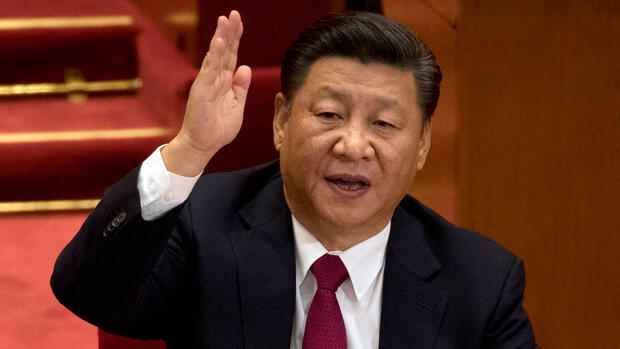In recent months it has become increasingly clear how strongly ideology-driven the Chinese head of state is.
(Photo: AP)
China’s leaders like to use historical analogies to justify their rule and course. It is quite possible that historical facts are adjusted in such a way that they suit the Communist Party. A historical revisionist analysis recently sparked heated debates.
It challenges the conventional wisdom that medieval China’s isolation, a kind of early decoupling, contributed significantly to the decline of the earlier advanced civilization and was the cause of the country’s “backwardness”.
The timing of the publication, shortly before the big party congress in October, is no coincidence. He fuels concern that the new leadership around the old and undoubtedly new party leader Xi Jinping will push ahead with decoupling from the West even more.
In recent months it has become increasingly clear how strongly ideology-driven the ruler is, although he himself has never made a secret of it. His “socialism with Chinese characteristics” is intended to overshadow western, free-market democracies, which are already in decline.
Top jobs of the day
Find the best jobs now and
be notified by email.
Xi knows how to use history for his political ends. “History is like a mirror for people, from which they can draw wisdom for today,” he wrote in the land register of the Chinese Academy of History when it was founded in 2019.
In the weekly column we take turns writing about innovation and economic trends in Asia.
(Photo: Klawe Rzeczy)
The very government body that has now published the much-discussed analysis defending China’s isolation during much of the Ming (1368-1644) and Qing (1636-1912) dynasties. The authors argue that the policy of foreclosure served to combat “aggressive Western colonial powers” and to defend China’s “territorial and cultural integrity.” This is frighteningly similar to today’s Chinese propaganda.
Observers therefore fear that the historical and ideological basis for a new long march could be laid with the reinterpretation of history. A march out of the globalized world. The Chinese government’s commitment to an open-door policy is being called into question. So far, there are no signs that the Chinese government could end the strict zero-Covid policy and the country’s ongoing and rigorous lockdown.
Pandemic as an excuse for lockdown
Observers fear that the pandemic could be a welcome excuse for the state leadership to permanently isolate the country. Reports that Chinese citizens’ passports are summarily torn up upon entering China fit into this picture. Representatives of a Chinese company have long since admitted privately that they fear that China could become more and more isolated.
With the Russian invasion of Ukraine and the escalation of the Taiwan conflict, additional trouble spots between China and the West have flared up. The state leadership under Xi Jinping has been pursuing a decoupling strategy from the West since 2020. He recently praised the successes to date in front of comrades: China’s dependence on foreign trade had halved between 2006 and 2019 from 67 percent to 32 percent. Should the Corona shock treatment prove that the Chinese economy can also prosper without the West?
More posts from Asia Technonomics:
One of the most well-known nationalist online commentators, Hu Xijin, condemned discussions surrounding the new analysis. There are no signs that China is planning to close itself off, wrote the former editor-in-chief of the party’s mouthpiece, the Global Times. This brings back memories of GDR head of state Walter Ulbricht and his famous quote: “No one intends to build a wall.”
In the Asia Techonomics column, Nicole Bastian, Sabine Gusbeth, Dana Heide, Martin Kölling and Mathias Peer take turns commenting on innovation and economic trends in the world’s most dynamic region.
